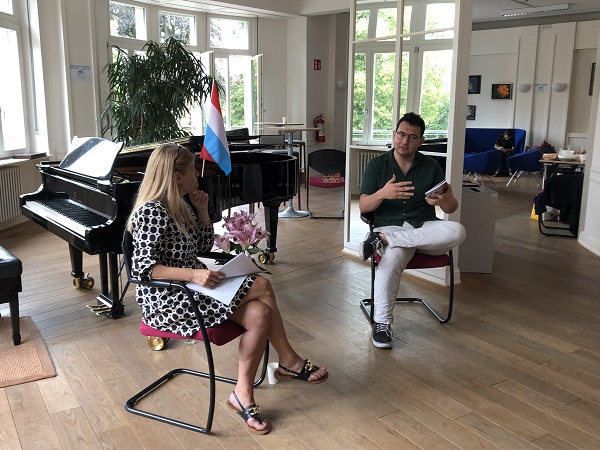 Credit: Otilia Dragan/Chronicle.lu
Credit: Otilia Dragan/Chronicle.lu
On the afternoon of Sunday 18 June 2023, the local non-profit organisation d’Bréck held a reading and presentation event at the Foyer Européen in Luxembourg-Gare to introduce Ognyan “Flame” Darinov’s debut poetry collection.
D’Bréck is a politico-cultural movement for an inclusive Luxembourg and for cultural visibility. The organisation mentioned having recently started publishing and Loose-Leaf Poetry is its first publication.
Flame Darinov was interviewed for the occasion by Videlina Dimitrova. He completed his secondary school studies in Bulgaria and after graduation, he focused on learning Spanish and French. Afterwards, when he moved to Luxembourg for his undergraduate studies, he felt motivated to learn German and Luxembourgish. He explained that the “mix of languages” present in Luxembourg was what brought him here and what kept him coming back.
Flame explained that this poetry book was a collaborative work with Cosimo Suglia (who wrote the afterword) and Nicolas Calmes (who drew the cover image and other sketches throughout the book) and who accompanied him on his “writing journey”. He stressed that this book was not just about himself but also about the people in his life who helped him continue writing.
Before each chapter, there is an illustration and each chapter is titled in Luxembourgish and Bulgarian. He explained: “I tend to write in the languages I speak at the moment”. The poetry collection reflects his journey of coming to Luxembourg and the various set of experiences leading to multilingualism; the collection is mainly in English, containing elements from other languages.
Flame explained that he wrote for an audience who might see themselves in a perpetual search of “themselves, of new things” and of “the foreign”. He read three poems for the audience of over 20 people, who listened spellbound to his spirited performances of “A Thirst for Thirst”, “Coalescence” and “Spekulatioun”.
Lastly, he noted that poetry is a “search for harmony,” and that he tried to find harmony in a blend of languages that do not necessarily harmonise.
Chronicle.lu had the opportunity to interview him after the reading. He named “Everyone Wants to Change This Poem” as one of his favourite poems in the collection, explaining how, during the writing process, all the people he asked corrected his “bad Luxembourgish”. The result was a poem with a meta-narrative aspect that in some ways outsmarted him by criticising his attempt at using this new language. “Spekulatioun” was another poem he named a personal favourite about finding the connections between the people and things he loves, the crux of what he finds most crucial about poetry. What he finds most important about poetry, he stressed, is the sense of insight and divination or symbolism emerging from everyday occurrences.
In terms of what he hoped for his readers to get from his poetry collection, he named first and foremost the “feeling a foreigner in Luxembourg goes through interacting and trying to find themselves abroad.” He also mentioned this as a collection to which queer readers (especially queer men) might relate, as it illustrates the “longing for love and connection with other men”, and “understanding” although it sometimes feels impossible.
Flame explained that one of his biggest challenges was the fact that there was no immediate connection between all the poems and that most of them are over four years old. He felt that this collection was written by “a past self, a lost, young person wanting connections he [now] has.” But the point when it all came together, he explained, was the moment when he named each section to reflect a negation of itself. Embracing this self-negation was very important to reflect the dual, ambivalent nature of his new outlook of the experiences that led him to where he is now.
Copies of Loose-Leaf Poetry are available from d’Bréck via email: dbreckletzebuerg@gmail.com.








